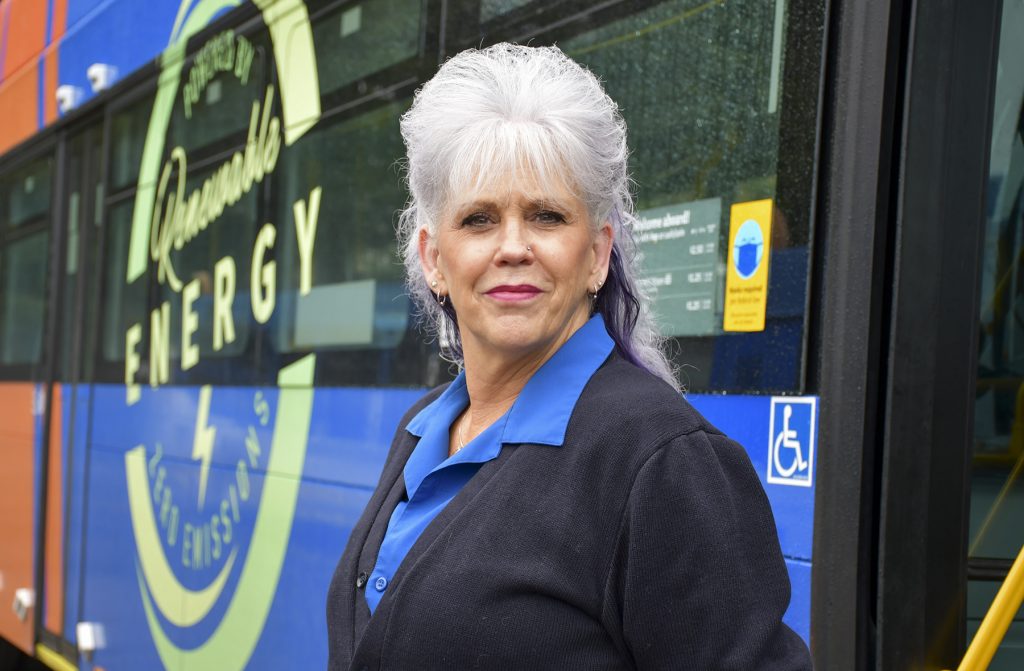With 28 years at TriMet, one bus operator has the unique experience of driving our original articulated buses, as well as our only 60-foot, fully converted, diesel-to-electric bus
With nearly three decades as a bus operator with TriMet, it’s a good thing that Shelli enjoys driving. It’s a love that she made into a lifelong career. Shelli’s work at TriMet has not only fulfilled her passion. It’s enriched her life.
“In the last almost 29 years, a lot of things have happened in life, but this, my job here, was always the thing that I could count on,” she said.
While many aspects of the job have stayed the same—providing safe and reliable transportation at an expert level with a laser focus on customer service—the buses themselves have evolved. Shelli remembers them by the special series of numbers that TriMet assigns to each fleet. Today our newest buses are series 4300 that will be used for the Division Transit Project.
“The oldest buses that I’ve driven were the 3 and 400s, the white snub-nosed ones; we had the old 700s, which were articulated; and our newest ones that we had were the 1700s. When we were assigned one, we were very happy about it,” she remembers, but she had a soft spot for the big so-called “artics.”
“They were big. They were hot. They were dirty. They smelled really bad, but they were a lot of fun to drive,” she recalls.
TriMet retired our last fleet of articulated buses more than 20 years ago, so Shelli was stunned when she learned she’d need training to drive one of TriMet’s newest buses, #4101, also known as “Desert Rose.” It was a big, long diesel bus with an accordion center that TriMet purchased from Valley Metro in Phoenix, Ariz. at its midlife, about 12 years old. We sent it to our contractor, Complete Coach Works in California, where the bus was stripped down to its shell and rebuilt as what is believed to be the world’s first fully 60-foot, articulated bus convert from diesel to 100% electric.
“It was diesel back in the day. These ones are electric, so they ride much smoother. I mean, but as far as handling and the way they maneuver, they’re absolutely the same. They’re fun to drive. My favorites, hands down,” Shelli summed up.
With April’s Earth Day observations wrapping up and the region preparing for future, climate-related, extreme-weather events, Shelli appreciates the Desert Rose’s potential and sees the important role the technology behind it could play in TriMet’s transition to a zero-emissions bus fleet.
“They not only recycled this bus from diesel to electric, but they’ve upcycled it. I think if everybody can do a little bit of that, then we would definitely be a lot better off,” she said. “That TriMet is taking the initiative, I think is wonderful.”
Shelli’s happy to be along for the ride, especially as a TriMet bus operator who gets to sit behind the wheel.
“Because it’s a 60-foot long vehicle is amazing in itself, but that it’s the first one ever, that’s really quite an honor,” she said.
Road to zero emissions
TriMet has made a commitment to transition to a zero-emissions bus fleet by 2040, and the Desert Rose is one part of our larger electric bus testing program. We launched our first fleet of five, short-range electric buses manufactured by New Flyer in 2019. The Desert Rose and three of our 40-foot diesel bus underwent the full conversion to battery electric technology and began testing last year. Also in 2021, we expanded our fleet with the addition of five long-range electric buses, manufactured by GILLIG. As electric bus technology evolves, we will continue to test and evaluate systems to identify the best performance, maintenance, efficiency and cost, for our service and our region.
Shelli never expected to drive a bus like the Desert Rose, but with a few years before she heads off to retirement, Shelli says she wouldn’t change a thing.
“I came here with the notion that this was where I was going to stay until I retired. This is where I wanted to be for my job,” she summed up. “If I had to start this job over again today, I would.”
Shelli considers working at TriMet a rewarding career that provided a good life and offered financial freedom for herself and her family. Now, with a $7,500 hiring bonus and starting pay for all new operators increased to $25.24, it’s a great time to apply.
$25.24 to start, $7,500 bonus and more
TriMet must hire more than 300 bus operators to return staffing and service levels to where they were before the COVID-19 pandemic. All TriMet bus operators receive a comprehensive package of compensation, benefits and perks. Among them:
- Medical, dental, vision, disability and life insurance plans at low or no monthly cost
- Two retirement plans, with an 8% agency base pay contribution to employee’s 401a
- One week of paid vacation and up to 40 hours sick leave in the first year of employment, with paid time off increasing over time
- Health and dependent care spending accounts
- Access to our Employee Assistance Program with mental health and counseling services, legal assistance, financial coaching and home ownership programs
- Annual transit pass (valued up to $1200) for employee and eligible family members
- 24-hour access to five exclusive, low-cost, on-site fitness centers
- Representation by Amalgamated Transit Union (ATU) 757
Put yourself in the driver’s seat, and join the TriMet team! Visit trimet.org/driveforus to apply today.







